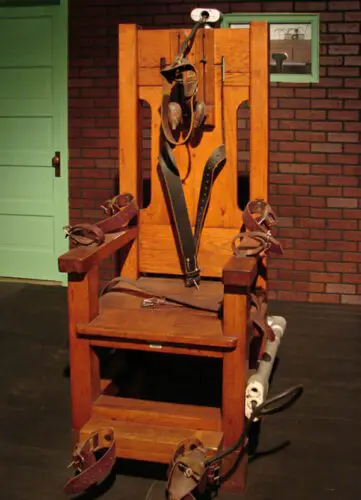Edward Byrne was executed by the State of Louisiana for a murder that took place during a robbery
According to court documents Edward Byrne would go to a gas station where his ex girlfriend worked. Byrne attempted to rob the store and in the process would beat to death the woman with a hammer.
Whether or not this was a robbery gone bad or Edward Byrne wanted to kill the woman and the robbery was a cover up is not known
Edward Byrne would be arrested, convicted and sentenced to death
Edward Byrne would be executed by way of the electric chair on June 14 1988
Edward Byrne FAQ
When was Edward Byrne executed
Edward Byrne was executed on June 14 1988
How was Edward Byrne executed
Edward Byrne was executed by way of the electric chair
Edward Byrne Case
A man who romanced a gas station cashier, robbed her and fatally bludgeoned her died early Tuesday in Louisiana’s electric chair. It was the 100th U.S. execution since capital punishment was reinstituted.
Lawyers for Edward R. Byrne Jr., 28, used up all their options Monday when Louisiana’s Pardon Board refused to recommend a commutation of the death sentence and then the U.S. Supreme Court refused to delay the execution.
Other state and federal courts refused earlier Monday to stop the third execution in Louisiana this year and the state’s 18th since the 1976 U.S. Supreme Court ruling allowing states to resume use of the death penalty
Byrne was executed at the Louisiana State Penitentiary for his admitted August 1984 hammer slaying of Roberta Johnson, who was 25 at the time. A coroner pronounced him dead at 12:12 a.m., said Jim Morris, deputy state corrections secretary.
When he arrived in the death chamber, Byrne showed no emotion. Asked if he had any final words, Byrne smiled slightly, shook his head and replied, ″Nope.″
After being strapped into the electric chair and masked, Byrne drummed his fingers while awaiting the first of a series of surges of electricity.
Six pro-capital punishment demonstrators stood outside the prison. One carried a sign that read: ″Thanks, Sam Jones,″ alluding to the pseudonym used to protect the anonymity of the penitentiary’s executioner.
The sign-carrier identified himself as Johnny Reece of Pineville and said he felt deprived because his daughter’s killer was sentenced to life imprisonment.
″It gives us a sense of justice to see this done to him (Byrne),″ Reece said. ″It doesn’t make me happy to see someone die, but it gives me a sense of satisfaction to see justice served.″
Byrne was calm as he ate his final meal at the Louisiana State Penitentiary Monday night after spending much of the day alone with his lawyers, Warden Hilton Butler said. No relatives visited Byrne and he asked for no spritual adviser, though prison chaplains would have been available if Byrne had changed his mind, said Butler.
At Monday’s Pardon Board hearing, Byrne was described by defense attorneys Amanda Potterfield and Nancy Baumgartner as a sensitive, articulate jailhouse poet who helped other inmates write letters to loved ones.
Four of the five pardon board members who heard Byrne’s case voted against a lighter sentence. A fifth member was absent. The Pardon Board has no power to stop executions, but can recommend sentence reductions for approval by Gov. Buddy Roemer.
Byrne admitted he started dating Johnson because he knew she handled large sums of money at the service station where she worked. But he insisted he never meant to kill her.
Johnson died after being struck repeatedly with a ball peen hammer.
″I just attempted to knock her unconscious,″ Byrne told the Pardon Board. ″It didn’t work.″
Byrne’s application to the Supreme Court for a stay was denied with the standard dissent by Justices William J. Brennan and Thurgood Marshall, who dissent to all executions, said court spokeswoman Toni House. Justices Harry A. Blackmun and John Paul Stevens indicated they also would have granted the stay, Ms. House said, but noted that it takes five justices to grant such a stay.
A second application also was denied with dissents by Brennan and Marshall, with Stevens indicating he also would have granted the stay, she said.
At the Pardon Board hearing, which took place at the prison, defense lawyers had Yousef Danesh, a Southern University professor of political science, read poetry by Byrne.
Baumgartner said Byrne was a young man deeply remorseful about the death he had unintentionally caused.
Henry Brown, painted Edward Byrne as a manipulative rogue and cold, calculating killer. Brown said Byrne had been caught in a Leesville hotel room the morning after the killing with a barmaid he had picked up at a nearby tavern and had proposed marriage to.
Parked outside was a car Byrne had stolen from the woman he lived with before getting involved with Johnson, the prosecutor said.
